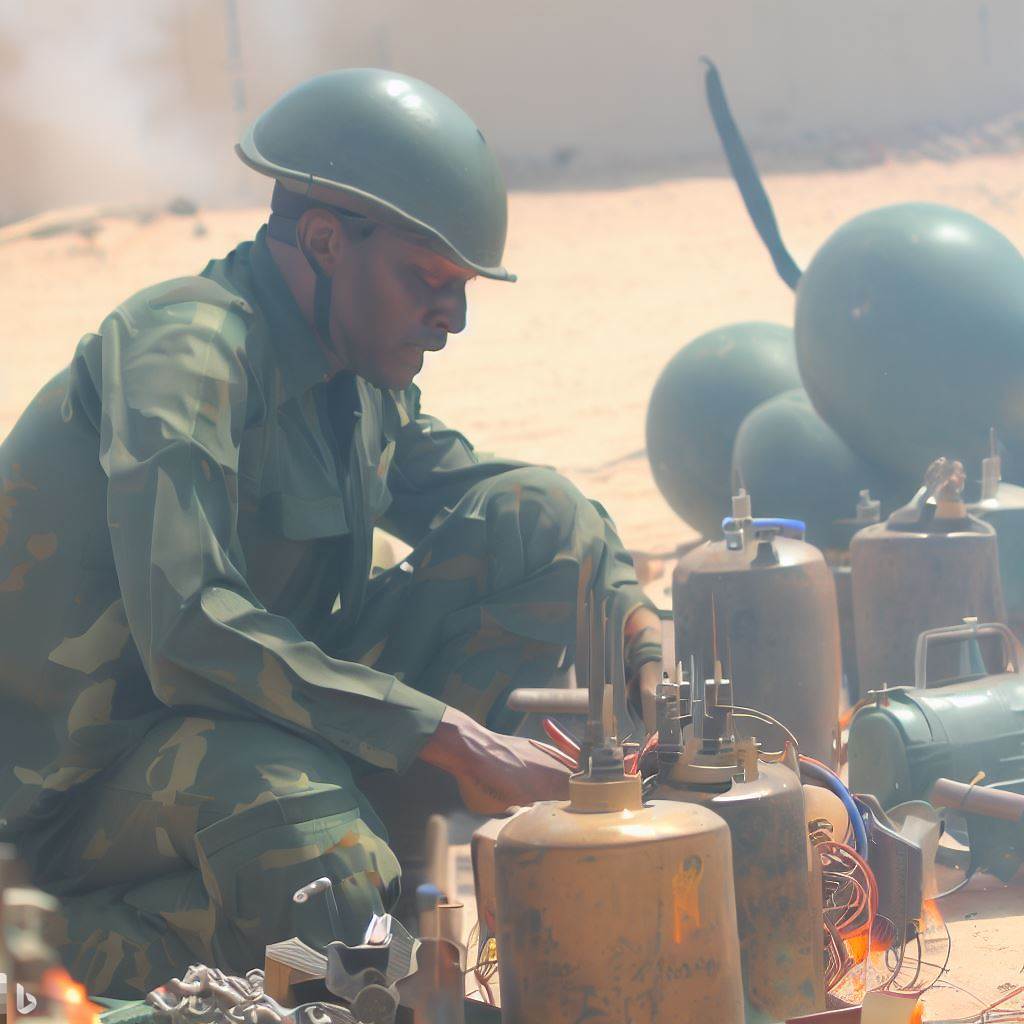Introduction
Bombs have become prevalent in Nigeria, posing a significant threat to public safety.
Bomb disposal plays a crucial role in neutralizing these threats.
- Nigeria has faced a significant threat from explosive devices, both homemade and from insurgent groups.
- Bombs pose grave risks, targeting civilians, infrastructure, and security forces.
- The frequency of bomb incidents necessitates efficient bomb disposal measures.
Importance of Bomb Disposal in Ensuring Public Safety:
- Immediate Threat Mitigation: Swift and accurate bomb disposal prevents immediate harm to people and property.
- Counterterrorism: Effective disposal hampers terrorist activities, safeguarding national security.
- Community Confidence: Public safety depends on trust; proficient disposal efforts reassure communities.
- Economic Stability: Bomb attacks disrupt economies; disposal helps maintain stability.
- Protection of Critical Infrastructure: Safeguarding essential facilities like power plants and transportation networks is vital.
- Environmental Preservation: Proper disposal reduces environmental contamination.
- Training and Expertise: Developing skilled bomb disposal teams enhances response capabilities.
- International Cooperation: Collaboration with foreign agencies can improve disposal techniques.
In Nigeria, where bombs threaten lives and security, bomb disposal efforts are pivotal. They protect communities, maintain stability, and ensure public safety.
Overview of military bomb disposal in Nigeria
The Nigerian military plays a crucial role in bomb disposal operations within the country.
They are responsible for ensuring the safety and security of the nation by neutralizing explosive devices and preventing potential attacks.
Role of the Nigerian military in bomb disposal
The Nigerian military is tasked with the responsibility of identifying, locating, and safely neutralizing explosive devices to protect civilians and critical infrastructure.
They work closely with other security agencies to gather intelligence and respond swiftly to potential threats.
Training and equipment used by the military for bomb disposal
The military undergoes rigorous training to develop specialized skills in bomb disposal.
They are trained in identifying different types of explosive devices, understanding their mechanisms, and employing appropriate methods to render them harmless.
The Nigerian military utilizes state-of-the-art equipment for bomb disposal operations.
These include bomb suits, bomb robots, X-ray scanners, and specialized vehicles equipped with technology to safely handle and dispose of explosive devices.
Success stories and challenges faced by the military in bomb disposal operations
The Nigerian military has recorded significant success in bomb disposal operations, saving countless lives and preventing catastrophic incidents.
Their expertise and dedication have enabled them to defuse numerous explosive devices successfully.
However, bomb disposal is an extremely risky and challenging task. The military faces various challenges, including the constant emergence of new and improvised explosives used by terrorist groups.
The complexity and diversity of these devices require continuous training and adaptation to ensure effective disposal.
The lack of real-time intelligence and advanced technological capabilities also pose obstacles to the military’s bomb disposal operations.
They rely heavily on community cooperation and information sharing to identify and locate hidden explosive devices.
Furthermore, the safety of bomb disposal personnel is a paramount concern. They put their lives at risk to protect others, operating in high-stress situations with limited timeframes.
The military continually invests in training and equipment to ensure the safety and well-being of their personnel.
In fact, the Nigerian military plays a crucial and challenging role in bomb disposal operations.
Their specialized training, advanced equipment, and dedication have led to significant successes in neutralizing explosive devices.
However, they face various challenges that require continuous adaptation and improvement to stay ahead of evolving threats.
The safety of their personnel and the protection of civilians remain their top priorities in these dangerous operations.
Read: Nigerian Military Officer Duties: A Day in the Life
Overview of civilian bomb disposal in Nigeria
Overview of civilian bomb disposal in Nigeria
Nigeria relies on civilians, including police bomb disposal units, private companies, and NGOs, for bomb disposal.
Role of civilians in bomb disposal
Civilians play a crucial role in bomb disposal operations in Nigeria.
Police bomb disposal units are responsible for responding to bomb threats and securing explosives.
Private companies provide specialized expertise and equipment for bomb disposal.
NGOs contribute by raising awareness, educating communities, and supporting bomb disposal efforts.
Training and equipment used by civilians
Civilians undergo rigorous training to handle various types of explosive devices safely.
They are equipped with protective gear, bomb suits, bomb disposal robots, and detection equipment.
Specialized training programs are conducted by international organizations to enhance civilian bomb disposal capabilities.
Success stories and challenges faced by civilians
Civilians have achieved significant success in neutralizing explosive devices and preventing potential attacks.
They have saved countless lives and minimized the impact of bombings in Nigeria.
However, civilians also face numerous challenges in bomb disposal operations.
They often operate in high-risk environments where the threat of explosions and attacks is constant.
Insufficient funding, limited resources, and inadequate support from authorities pose significant obstacles.
Furthermore, lack of public awareness and understanding about bomb threats hinders effective civilian response.
Read: Technological Advances in Bomb Disposal in Nigeria
Comparison between Military and Civilian Bomb Disposal
In Nigeria, bomb disposal is a critical operation that requires skilled professionals to neutralize explosive devices and ensure public safety.
Two major entities responsible for bomb disposal are the military and civilian units. Let’s compare their effectiveness, response time, applicability, and collaboration:
Effectiveness in Neutralizing Bombs
The military bomb disposal units have extensive training in handling various types of explosives.
Their expertise and experience make them highly effective in neutralizing bombs and reducing the threat of detonation.
On the other hand, civilian bomb disposal units may lack the same level of specialized training as the military.
However, they make up for it with their knowledge of local communities and understanding of improvised explosive devices (IEDs) specific to Nigeria.
Response Time and Availability for Emergency Situations
When it comes to response time, military bomb disposal units often have an advantage due to their constant readiness and strategic positioning.
They are equipped to swiftly respond to emergency situations and minimize casualties.
Civilian bomb disposal units, on the other hand, may face challenges in terms of availability and response time.
With limited resources and personnel, their response may be delayed, especially in remote or rural areas where transportation infrastructure is lacking.
Applicability in Different Settings
Both military and civilian bomb disposal units have their strengths in different settings.
In urban areas where the threat of terrorism is higher, military units with their advanced equipment and tactical training excel in neutralizing complex threats.
In rural areas, civilian bomb disposal units can navigate the local terrain and understand the specific challenges posed by IEDs used by insurgents.
Their knowledge of the local culture and networks can be advantageous in countering threats effectively.
Collaboration and Coordination between Military and Civilian Bomb Disposal Units
Collaboration and coordination between military and civilian bomb disposal units are crucial for maximizing effectiveness and minimizing risks.
Joint training exercises, information sharing, and regular communication channels enable seamless cooperation.
Military units can benefit from civilian units’ local knowledge, while civilians can learn from military expertise in handling high-level threats.
This collaboration strengthens the overall bomb disposal capabilities in Nigeria.
In essence, the comparison between military and civilian bomb disposal units in Nigeria reveals that each has its merits and areas of specialization.
The military units exhibit effectiveness, rapid response, and specialized training, while civilian units bring local knowledge and an understanding of specific threats.
Collaboration and coordination between these units are vital for a comprehensive and robust bomb disposal system in the country.
Read: How to Apply for Bomb Disposal Jobs in Nigeria

Ethical considerations and public perception of military vs. civilian bomb disposal
When it comes to bomb disposal operations in Nigeria, there are ethical considerations and public perception that differ between the military and civilian sectors.
Trust and credibility of each sector
- The military has built trust and credibility over time due to their extensive training and experience.
- Civilians, although trained in bomb disposal, may face skepticism regarding their capabilities and expertise.
- The public tends to trust the military more with bomb disposal operations due to their perceived higher level of competence.
- Civilians, on the other hand, may be seen as more approachable and less intimidating.
Public perception of the two approaches
- The military is often associated with authority and power, which can be both reassuring and intimidating to the public.
- Civilians, particularly those from humanitarian organizations, may be seen as being more empathetic and focused on saving lives.
- Some members of the public may prefer the military approach due to its perceived efficiency and effectiveness.
- Others may favor the civilian approach, appreciating the compassionate and humanitarian aspect.
Accountability and transparency in bomb disposal operations
- Military bomb disposal operations are subject to strict codes of conduct and are usually documented and reviewed internally.
- Civilian bomb disposal operations may not be as extensively documented, leading to concerns about accountability and transparency.
- The military is often required to report to higher authorities, ensuring that they are held accountable for their actions.
- Civilians, although more autonomous in their operations, may face challenges in providing transparent reports to the public.
In a nutshell, the ethical considerations and public perception of military vs. civilian bomb disposal in Nigeria vary significantly.
While the military may have a higher level of trust and credibility, civilians are seen as more approachable. The public perception of the two approaches can differ depending on preferences for authority or empathy.
Furthermore, accountability and transparency play a crucial role in ensuring public trust in bomb disposal operations, with the military often having more established protocols in place.
Overall, a collaborative effort between the military and civilian sectors could provide a balanced approach that encompasses both efficiency and humanitarian values.
Read: Nigeria’s Bomb Disposal Heroes: Notable Individuals
Conclusion
A coordinated and effective bomb disposal strategy is of utmost importance in Nigeria. The safety and security of both military personnel and civilians depend on it.
Continuous improvement and innovation in bomb disposal techniques are vital to stay ahead of the evolving tactics of terrorists.
It is crucial for Nigeria to strengthen its bomb disposal capabilities by investing in technology, training, and resources. The government should prioritize this area to ensure the safety and well-being of its citizens.
By doing so, Nigeria can effectively combat the threat of terrorism and protect the lives of both military personnel and civilians. Together, we can create a safer and more secure future.




